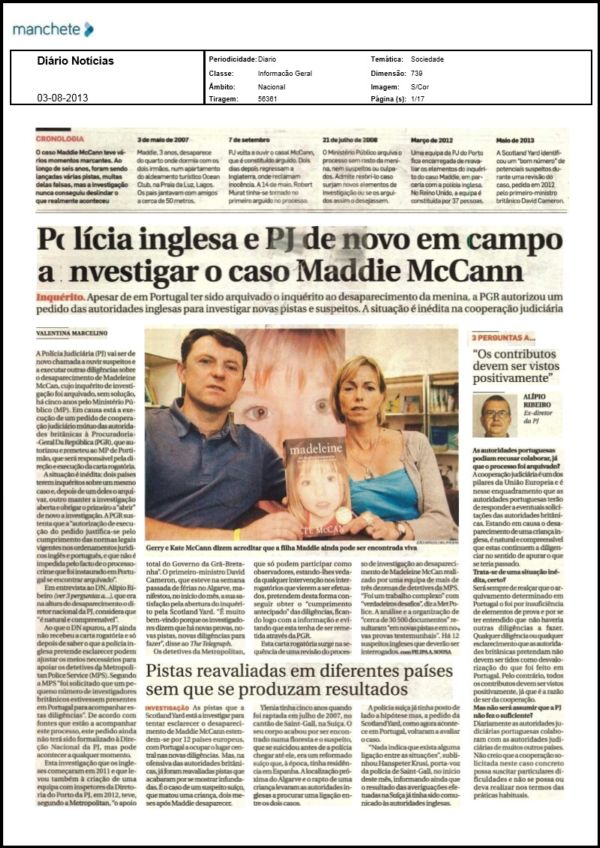|
English police and PJ investigate the
Maddie McCann case again
Inquiry.
Although in Portugal the inquiry into
the little girl's disappearance was
archived, the Attorney General has
granted a request from the English
authorities to investigate new leads and
suspects. The situation is unheard of
within judiciary cooperation
The Judiciary Police (PJ) will again be
requested to hear suspects and to carry
out other actions concerning the
disappearance of Madeleine McCann, whose
investigation inquiry was shelved,
without a solution, five years ago by
the Public Ministry (MP). The execution
of a request for mutual judiciary
cooperation made by the British
authorities to the Attorney General's
Office (PGR), who granted it and
forwarded it to the Public Ministry of
Portimão, that will be responsible for
directing and carrying out the rogatory
letter, is at stake.
The situation is unheard of: two
countries that opened inquiries into the
same case, and after one of them
archived it, the other keeps the
investigation open and forces the first
one to "reopen" the investigation. The
Attorney General's Office sustains that
"granting the execution of the request
is justified by compliance with existing
legal norms within the English and the
Portuguese legal orders, and it is not
impeded by the fact that the criminal
case that was opened in Portugal is
shelved".
In an interview to DN newspaper, Alípio
Ribeiro, who at the time of the
disappearance was the PJ's national
director, considers it to be "natural
and understandable".
As far as DN newspaper was able to
establish, the PJ has not received the
rogatory letter yet, and only after they
know what the English police wants to
clarify, can the necessary means to
support the detectives from the
Metropolitan Police Service (MPS) be
adjusted. According to the MPS, "it has
been requested that a small number of
British investigators would be present
in Portugal to accompany these actions".
According to sources that are following
this process, said request has not been
submitted to the PJ's National
Directory, but that could happen at any
moment.
This investigation that the English
started in 2011 and that also led to the
creation of a team with inspectors from
the PJ's Oporto Directory, in 2012, has
had, according to the Metropolitan, "the
full support of Great Britain's
Government". Prime minister David
Cameron, who was on holiday in the
Algarve last week, expressed, at the
start of the month, his satisfaction in
the opening of the inquiry by the
Scotland Yard. ""It is welcome because
they say that there is new evidence, new
leads to follow, new things to be done",
he told The Telegraph.
The Metropolitan's detectives, who can
only participate as observers, as any
intervention in the questioning that
will be carried out is forbidden for
them, wish to obtain the "anticipated
fulfillment" of the diligences in this
manner, keeping the information right
away and thus avoiding that it has to be
sent through the Portuguese General
Attorney's Office.
This request for mutual assistance
appears following a revision of the
investigation into the disappearance of
Madeleine McCann that was carried out by
a team of more than thirty MPS
detectives.
"It was a complex task" with "true
challenges", the Met Police says. The
analysis and organisation of
"approximately 30 500 documents"
resulted in "new leads and new witness
evidence". There are 12 English suspects
that should be questioned.
Leads reevaluated in different countries
produce no results
Investigation. The leads that the
Scotland Yard is investigating to try to
clarify the disappearance of Maddie
McCann extend over 12 European
countries, with Portugal taking the
centre position of the new diligences.
Nevertheless, within the British
authorities' offensive, leads have been
reevaluated that ended up being
unfounded. That is the case of a Swiss
suspect who killed a child two months
after Maddie disappeared.
Ylenia was five years old when she was
abducted in July 2007, in Saint-Gall, in
Switzerland. Her body was found in a
forest and the suspect, who committed
suicide before the police could get to
him, was a Swiss pensioner who at the
time was a resident in Spain. The close
location to the Algarve and the
abduction of a child led the English
authorities to search for a connection
between both cases.
The Swiss police had already set the
possibility aside, but after a request
from the Scotland Yard, as it now
happens in Portugal, they reevaluated
the case.
"There is nothing to indicate a
connection between the situations",
Hanspeter Krusi, the spokesman for
Saint-Gall police, stressed earlier this
month, further informing that the result
of the investigations in Switzerland had
already been communicated to the English
authorities.
3 questions for Alípio Ribeiro, former
PJ Director
"Contributions should be seen in a
positive manner"
- The Portuguese authorities could
refuse to cooperate, as the process has
been shelved?
- Judiciary cooperation is one of the
European Union's pillars and it is
within that frame that the Portuguese
authorities will have to respond to
possible solicitations from the British
authorities. As the disappearance of an
English child is at stake, it is natural
and understandable that they continue to
work in the sense of finding out what
happened.
- This is an unheard of situation,
right?
- It should always be stressed that the
archiving that took place in Portugal
happened due to an insufficiency of
evidence and because it was decided that
there was no further action to take. Any
action or any clarification that the
British authorities want must not be
seen as a devaluation of what was done
in Portugal. On the contrary, all
contribution must be seen in a positive
manner, as it is the reason why there is
cooperation in the first place.
- But could it be assumed that the PJ
has not done enough?
- The Portuguese judiciary authorities
cooperate with the judiciary authorities
in many other countries, on a daily
basis. I do not believe that the
cooperation that is requested in this
particular case may cause specific
difficulties and cannot or should not be
carried out within the score of habitual
practices.
in: Diário de Notícias, 03.08.2013 |



